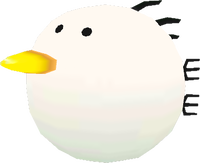Bowling Goonie
| Bowling Goonie | |
|---|---|
 Model from Yoshi's New Island | |
| First appearance | Super Mario World 2: Yoshi's Island (1995) |
| Latest appearance | Yoshi's New Island (2014) |
| Variant of | Hefty Goonie Flightless Goonie |
Bowling Goonies[1] are wingless Hefty Goonies that first appear in Super Mario World 2: Yoshi's Island and its Game Boy Advance version. Instead of flying, they slowly roll on the ground as their method of travel. Many Bowling Goonies are found directly on Yoshi's path, but some are the result of hitting a Hefty Goonie with an egg or grabbing it in Yoshi's mouth and then spitting it out. Bowling Goonies cause damage if they roll into Yoshi, but can be defeated with a Ground Pound or an egg. Yoshi can also walk on a Bowling Goonie as on a platform. Unlike Hefty Goonies, Bowling Goonies cannot be eaten. They are capable of rolling at the same speed on both horizontal and inclined surfaces and will roll off any edge that they encounter.
Bowling Goonies in Yoshi's New Island appear in Fine Feathered Friends or Foes? and Punkey the Pokey Prince's Castle. They behave and can be interacted with almost exactly like in Super Mario World 2: Yoshi's Island, with the only difference being that default Bowling Goonies turn the other way when they encounter an edge of any kind, but those that are spat out by Yoshi still roll off edges.
Profiles[edit]
Super Mario World 2: Yoshi's Island / Yoshi's Island: Super Mario Advance 3[edit]
- Shogakukan guide: 「あほーむしのデブ
版 。ころころと向 かってくるぞ。動 はにぶいけど、大 きいのでせまい通路 などではよけにくいぞ。おまけに食 べられない。」[2] (A hefty version of Flightless Goonie. It comes rolling towards you. Though slow to move, its large size makes it difficult to avoid in narrow passages. Plus, it is inedible.) - Player's Guide: Without wings or legs, this chubby Goonie just keeps rolling along.[1]
Gallery[edit]
Naming[edit]
Internal names[edit]
| Game | File | Name | Meaning
|
|---|---|---|---|
| Yoshi's New Island | G:/content0.game/romfs/param/enemy/debu_aho_mushi.csv | debu_aho_mushi | Romanization of「デブあほーむし」(Debu Ahō Mushi, Hefty Flightless Goonie) |
Names in other languages[edit]
| Language | Name | Meaning | Notes |
|---|---|---|---|
| Japanese | デブあほーむし[2] Debu Ahō Mushi |
From「デブあほーどり」(Debu Ahō Dori, "Hefty Goonie") and「むし」("bug"), likely in reference to「あほーむし」(Ahō Mushi, "Flightless Goonie") | |
| German | Kuller Birdie[3] | Rolling Goonie |
References[edit]
- ^ a b Miller, Kent, and Munson, Terry (1995). Super Mario World 2: Yoshi's Island Player's Guide. Nintendo of America (American English). Page 126.
- ^ a b Takahashi, Kotaro, editor (1995). 『スーパーマリオヨッシーアイランド全百科 オールカラー版』. Tokyo: Shogakukan (Japanese). ISBN 4-09-281140-3. Page 78.
- ^ Menold, Marcus, John D. Kraft, and Thomas Görg, editors (1995). Der offizielle Nintendo Spieleberater "Super Mario World 2 – Yoshi's Island". Großostheim: Nintendo of Europe GmbH (German). Page 18.


